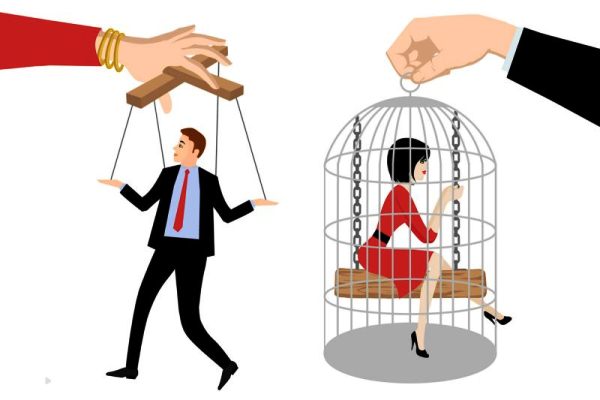- What is Motivation? The best motivational quotes of all time
- What is Love Analysis? What is a beautiful love?
- What is NTR? What does NTR mean in manga comics?
What is victim manipulation?
Gaslighting is a form of manipulation that occurs in abusive relationships. It is an insidious, and sometimes covert, type of emotional abuse where the bully or abuser makes the target question their judgments and reality.
Ultimately, the victim of gaslighting starts to wonder if they are going crazy.
Gaslighting primarily occurs in dating and married relationships, but it’s not uncommon for it to occur in controlling friendships or among family members as well. Toxic people use this type of manipulation to exert power over others in order to manipulate friends, family members, and sometimes even co-workers.
History of the term
- The term gaslighting comes from the 1938 play by Patrick Hamiltion, known in America as “Angel Street” and later developed into the film “Gas Light” by Alfred Hitchcock.3 In the suspense film, a manipulative husband tries to make his wife think she is losing her mind by making subtle changes in her environment, including slowly and steadily dimming the flame on a gas lamp. Not only does he disrupt her environment and make her believe she is insane, but he also abuses and controls her, cutting her off from family and friends.
- Consequently, the wife is constantly second-guessing herself, her feelings, her perceptions, and her memories. Additionally, she feels neurotic, hypersensitive, and out-of-control, which is the goal of gaslighting to leave the target feeling off-kilter and unsure of what is true and what isn’t.
- Because this film was an accurate portrayal of the controlling and toxic actions that manipulative people use, psychologists and counselors began to label this type of emotionally abusive behavior “gaslighting.”

How Gaslighting Works
Gaslighting is a technique that undermines your entire perception of reality. When someone is gaslighting you, you often second-guess yourself, your memories, and your perceptions.
After communicating with the person gaslighting you, you are left feeling dazed and wondering what is wrong with you.1 Tactics like these can confuse you and cause you to question your sanity. Here’s a closer look at how people gaslight others.
Lying to You
- People who engage in gaslighting are habitual and pathological liars. They will blatantly lie to your face and never back down or change their stories, even when you call them out or provide proof of their deception. Lying is the cornerstone of their destructive behavior. Even when you know they are lying, they can be very convincing. In the end, you start to second-guess yourself.
Discrediting You
- Gaslighters spread rumors and gossip about you to others. They may pretend to be worried about you while subtly telling others that you seem emotionally unstable or crazy. Unfortunately, this tactic can be extremely effective and many people side with the abuser or bully without knowing the full story.
- Additionally, the gaslighter may lie to you and tell you that other people think you are crazy. These people may never say a bad thing about you, but the gaslighter will make every attempt to get you to believe they do.
Deflecting Blame
- When you ask a gaslighter a question or call them out for something they did or said, they may change the subject by asking a question instead of responding to the issue at hand. They may blatantly lie about the situation by saying something like: “You’re making things up. That never happened.
Minimizing Your Thoughts and Feelings
- Trivializing your emotions allows the gaslighter to gain power over you. They might make statements like: “Calm down,” “You’re overreacting,” or “Why are you so sensitive?” All of these statements minimize how you’re feeling or what you’re thinking and communicate that you’re wrong.
- When you deal with someone who never acknowledges your thoughts, your feelings, or your beliefs, you will begin to question them yourself. What’s more, you never feel validated or understood, which can be extremely difficult to cope with.

Shifting Blame
- Blame-shifting is another common tactic of gaslighters. Every discussion you have is somehow twisted to where you are to blame for something that occurred. Even when you try to discuss how their behavior makes you feel, they’re able to twist the conversation and end up blaming you.
- In other words, they manipulate the situation in such a way that you end up believing that you are the cause for their bad behavior. They claim that if only you behaved differently, they would not treat you the way that they do.
Denying Wrongdoing
- Bullies and abusers are notorious for denying that they did anything wrong. They do this to avoid taking responsibility for their poor choices. But it also leaves the victim of gaslighting confused and frustrated because there is no acknowledgment of the pain they feel. This denial also makes it very hard for the victim to move on or to heal from the bullying or abusiveness.
Using Compassionate Words as Weapons
- Sometimes when called out or questioned, a gaslighter will use kind and loving words to try to smooth over the situation. They might say something like “You know how much I love you. I would never hurt you on purpose.” These words are what you want to hear, but they are not authentic, especially if the same behavior is repeated.
- When you are dealing with someone who uses gaslighting as a manipulation tool, pay close attention to their actions, not their words. Is this person truly loving, or are they only saying loving things?
Twisting and Reframing Conversations
- Gaslighters typically use this tactic when you are discussing something that happened in the past. For instance, if your partner shoved you against the wall and you are discussing it later, they may twist the story in their favor. They may say you stumbled and they tried to steady you, which in turn caused you to fall into the wall.
- When stories and memories are constantly retold in the gaslighter’s favor, you may begin to doubt your memory of what happened. This confusion or second-guessing on your part is exactly the goal.

15 Gaslighting Signs to Look For
Being subjected to gaslighting can cause anxiety and depression. It also has been linked to panic attacks and nervous breakdowns. For this reason, it is important to recognize when you’re experiencing gaslighting. Ask yourself if any of the following statements ring true.
1. You doubt your feelings and reality. You try to convince yourself that the treatment you receive is not that bad, or that you are too sensitive.
2. You question your judgment and perceptions. You are afraid of speaking up or expressing your emotions. You have learned that sharing your opinion usually makes you feel worse in the end. So you stay silent instead.
3. You feel vulnerable and insecure. You often feel like you “walk on eggshells” around your partner/friend/family member. You also feel on edge and lack self-esteem.
4. You feel alone and powerless. You are convinced that everyone around you thinks you are strange, crazy, or unstable, just like your partner/friend/family member says you are. This makes you feel trapped and isolated.
5. You wonder if you’re stupid and crazy. Your partner/friend/family member’s words make you feel like you are wrong, inadequate, or insane. Sometimes you even find yourself repeating these statements to yourself.
6. You are disappointed in yourself and who you have become. For instance, you feel like you are weak and passive and that you used to be stronger and more assertive.
7. You feel confused. Your partner/friend/family member’s behavior confuses you—with actions that appear like Dr. Jekyll and Mr. Hyde.
8. You worry that you are too sensitive. Your partner/friend/family member minimizes hurtful behaviors or words by saying “I was just joking” or “You are too sensitive.”
9. You have a sense of impending doom. You feel like something terrible is about to happen when you are around your partner/friend/family member. This may include feeling threatened and on edge without knowing why.

10. You spend a lot of time apologizing. You feel the need to apologize all the time for what you do or who you are.
11. You feel inadequate. You feel like you are never “good enough.” You try to live up to the expectations and demands of others, even if they are unreasonable.
12. You second-guess yourself. You frequently wonder if you accurately remember the details of past events. You may have even stopped trying to share what you remember for fear that it is wrong.
13. You assume others are disappointed in you. You apologize all the time for what you do or who you are, assuming people are disappointed in you or that you have somehow made a mistake.
14. You wonder what’s wrong with you. You wonder if there’s something fundamentally wrong with you. In other words, you worry that you might truly be crazy, neurotic, or “losing it.”
15. You struggle to make decisions because you distrust yourself. You would rather allow your partner/friend/family member to make decisions for you, or avoid decision-making altogether.
Final thoughts
If you identify with any of these signs of gaslighting, it’s important that you seek professional help right away. Left unaddressed, gaslighting can take a significant toll on your self-esteem and mental health. Your doctor can recommend a counselor who is equipped to help you process and deal with what is happening to you.
In the meantime, remember that you are not to blame for what you are experiencing. The person gaslighting you is making a choice to behave this way. They are responsible for their actions. Nothing you did caused them to make this choice and you won’t be able to change what they’re doing. But with counseling, you can learn how to make healthy choices and set boundaries with the person who engages in gaslighting.








Để lại bình luận
5